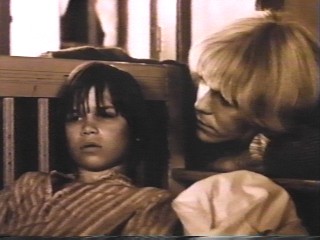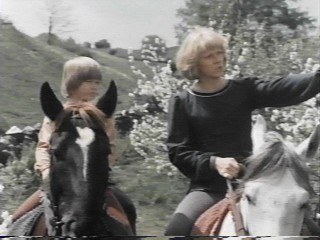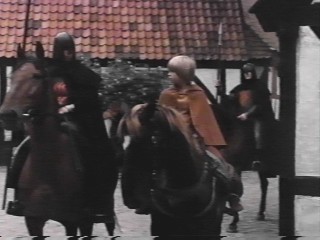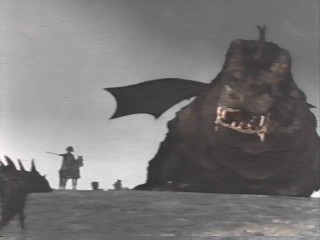
|
|
|
|
|
|
|
|
|
|
|
|
|
(1977) Director: Olle
Hellbom
From looking at their motion picture
product, it doesn't seem to me that Sweden is exactly a very exciting
country. Oh sure, they've made a ninja movie (Ninja Mission),
and They Call Her One Eye has plenty of hard core
violent sequences shot in slow motion that would please Sam Peckinpah.
(As well as hard-core sex to please those into that kind of thing.) It doesn't take long after the movie starts to realize that this is not going to be anything like your typical Disney movie. Somewhere in Sweden around the turn of the century, we meet Karl (Soderdahl), a sickly bed-ridden child who narrates for us, introducing us to his older brother Jonathan (Gotestan), a well-liked young adult of the community. Just seconds after meeting both Karl and Jonathan, Karl tells us, "It was the day that I found out that I was going to die soon." Though Karl pretty much has accepted that he won't be getting better, he complains to Jonathan, "It's horrible - that anyone should have to die before the age of ten." However, Jonathan tells him that only his outer self will die - his inner self will be transported to the magical land of Nangiola, "Somewhere beyond the farthest star, it's the land of fairy tales and songs around there fire." In Nangiola, you can do anything and everything, and you'll be healthy and happy there. And Jonathan then tells Karl that he will join him when he eventually dies himself. "I'll be going there sooner or later," he assures Karl. "That's what we thought," Karl tells us, "but it didn't turn out that way." Not long afterwards, the house catches on fire, and Jonathan is killed when he jumps out of the window with Karl in his arms. Alone now, Karl wonders if what his brother told him was the truth or not. He finds out soon - he dies himself shortly afterwards, and he wakes up in the middle of Nangiola's beautiful Cherry Valley. Karl is almost immediately reunited with Jonathan, and the next few days are paradise, riding horses and meeting the friendly inhabitants of Cherry Valley. What an unbelievable opening for a family
movie! Can you imagine any modern Hollywood Even if a few children are still upset by the whole child-death thing at this point, they will at least be comforted by the fact that afterwards the movie chooses to ignore (at least until the last few minutes) this whole afterlife theme, and goes for a more conventional plot. Not long after arriving in Nangiola, Karl senses something is not quite right, and Jonathan soon confirms this. The other half of Nangiola - Wild Rose Valley - has been conquered by the evil Tengle and his black knights. Jonathan works with a small group of Cherry Valley citizens helping the resistance, and he is soon called into infiltrating Wild Rose Valley in order to break free the captured resistance leader. Karl stays behind, but he quickly starts to worry about Jonathan, and feels he must get involved in the conflict somehow. Actually, while the plot sounds a lot more
kiddie-friendly than jumping out of a window to your death, here it's
not treated in the usual squeaky clean and unthreatening manner you
find in children's fantasies. Though Tengle is, unfortunately, another
of those "big boss" characters that hardly gets to do anything,
Tengle's black knights aren't your usual bad guy buffoons. They are
mean and vicious bastards, and will freely do something along the lines
of grabbing someone and branding them in their chest (though
tastefully, with the brandee's back towards us.) There are also several
deaths in the course of the movie. While they are all bloodless deaths,
there is a brutal Other viewpoints such as this come across during the movie, giving the audience something to think about - again, not your typical kiddie flick. Whenever the movie has something to say, it sure doesn't talk down to its audience. This attitude is not just with the writing, but with how director Olle Hellbom presents it. Though he does show Cherry Valley to be a lush and sunshine-filled heaven on earth, you'd be hard pressed to find any other part of the movie that looks as bright and inviting as it. The rest of the outdoor locations consist of dark and creepy forests, fields and hills of yellow grass, and rock mountains and plains with nary a hint of plant life. All of which is photographed under the bleakest, darkest, most overcast skies you can imagine - if not, then at night or during periods of thick fog. Interior locations would be completely pitch black if not for the limited light from candles and fireplaces. The musical score has a feeling of gloom to it as well, barely audible for the most part, and always playing sombre music. But a lot of this flat direction of Hellborm's actually
works for the movie's favor. It's obvious that the movie didn't have a
lot of money to spend; almost every location is in the wild or using a
pre-existing building instead of a set, there are few props, and the
few props and costumes there are aren't very elaborate. But since the
direction doesn't highlight these features and keeps everything looking
equally gloomy and dark, they don't look as unelaborate as they cold
have been. When it comes to portraying some big effects, however, the Will kids sit through an unconventional family movie like The Brothers Lionheart? That's a tough question to answer. Though it has child characters that they'll like and identify with, it also has a storyline that is more thoughtful and slower-paced than the typical Saturday morning product they are used to consuming. Also, they may not like the fact that the ending isn't as clean-cut as they are used to, nor the mood it ends at. In fact, I must confess that my jaw dropped during those last few minutes. Not because the ending was awful in any way (far from it), but that what is being dealt with has a greater magnitude than what was being presented in the opening minutes. I can only imagine how those suits would think of this ending. It's an ending so deep, that even though our children are smarter than we think, they may not be able to properly appreciate and process it. It is just one of the reasons why I think this family movie actually may be more appropriate for adults rather than their children. UPDATE: Christian von Schack sent this along: "Hi there. Just a quick note: the movie is a
condensed version of the series, I think. I got curious and checked
upon the IMDB; the TV version (which I remember very fondly from my
youth...I was nine, I think) is from 1985, compared to the film (which
I didn't know existed) from 1977. But it's the same crew in its
entirety, and since the roles of the brothers certainly would've been
stocked with younger actors (roughly eight years, I'd wager), it leads
me to suspect Swedish TV pulled a Das Boot on the Lionhearts;
movie and series shot simultaneously. UPDATE 2: Henning Leicht confirmed the TV origin: "It is, definitely! Like all other TV-versions of
Astrid Lindgren's novels UPDATE 3: "Jenny" sent this in: "I am a Swedish movielover that would just like to point out that you have spelled a few things wrong in your review of The Brothers Lionheart. The land is called Nangijala, not Nangiola, and the evil knight is called Tengil and not Tengle. Maybe not important to people outside of Sweden but to the Astrid Lindgren loving Swedes it's a matter of life and death (just kidding). I would however be happy if you could take the time to change the names, just for the sake of it. (Greywizard: In my defense, I must mention there
seems to be some disagreement with the spelling of the land. Though
it's "Nangijala" in Sweden, the English translation of the book spells
it as "Nangiyala". And I'm pretty sure the video box spelt it as
"Nangiola" - which it certainly sounds like from the dubbing. And I
won't even get into the confusion about the nickname Jonathan keeps
calling his younger brother...)
Check for availability on Amazon (VHS) See also: The Flight Of Dragons, Hearts & Armour, The Last Unicorn |
 But aside from those two movies,
the cinematic efforts of the Swedes haven't exactly popcorn
entertainment. What you see coming out of the country on a regular
basis are high-art movies in the vein of Ingmar Bergman, with no
explosions, guns, severed veins, or other entertaining material in
sight. Occasionally there is a non high-art movie made, though usually
not in the vein of those two previously mentioned action movies. One
such example is the family movie The Brothers Lionheart,
based on a novel by the author of the Pippi Longstocking series,
Astrid Lindgren (who also wrote the screenplay.) Though it isn't
totally removed from the Swedish tradition of art movies, it's still
quite different from the typical Swedish film. I can't recall any
family movie I've ever seen even remotely approaching this movie's
subject matter and approach to it. In fact, even though the story is
family-friendly and involves children, this family movie may actually
be more appreciated by adults than children.
But aside from those two movies,
the cinematic efforts of the Swedes haven't exactly popcorn
entertainment. What you see coming out of the country on a regular
basis are high-art movies in the vein of Ingmar Bergman, with no
explosions, guns, severed veins, or other entertaining material in
sight. Occasionally there is a non high-art movie made, though usually
not in the vein of those two previously mentioned action movies. One
such example is the family movie The Brothers Lionheart,
based on a novel by the author of the Pippi Longstocking series,
Astrid Lindgren (who also wrote the screenplay.) Though it isn't
totally removed from the Swedish tradition of art movies, it's still
quite different from the typical Swedish film. I can't recall any
family movie I've ever seen even remotely approaching this movie's
subject matter and approach to it. In fact, even though the story is
family-friendly and involves children, this family movie may actually
be more appreciated by adults than children. family movie
touching on kids being killed or struck with fatal illnesses? The suits
would be afraid they might traumatize the kids, and incur the wrath of
adults. But I don't think any but the most sensitive kid would be
freaked out by The Brothers Lionheart's opening. Kids
are a lot smarter than you think, and they know bad things can happen
to them, even if they don't deserve what comes to them. I'm sure
they'll appreciate the movie's honesty about such issues. They may be a
little unhappy at first, but their sad feelings will be washed away by
the joyous scene when the brothers are reunited. It is especially
joyous, because even just a few minutes into the movie we know of the
warm and respectful relationship the two boys have. The bedside chat,
where Jonathan tells Karl about Nangiola, shows quite clearly the two
brothers treat each other as equals and with great love. They don't
hold anything back from each other, but they are careful to deliver
whatever they say in the best way possible. Children and adult viewers
at this point will be engaged by the characters and care for them
deeply.
family movie
touching on kids being killed or struck with fatal illnesses? The suits
would be afraid they might traumatize the kids, and incur the wrath of
adults. But I don't think any but the most sensitive kid would be
freaked out by The Brothers Lionheart's opening. Kids
are a lot smarter than you think, and they know bad things can happen
to them, even if they don't deserve what comes to them. I'm sure
they'll appreciate the movie's honesty about such issues. They may be a
little unhappy at first, but their sad feelings will be washed away by
the joyous scene when the brothers are reunited. It is especially
joyous, because even just a few minutes into the movie we know of the
warm and respectful relationship the two boys have. The bedside chat,
where Jonathan tells Karl about Nangiola, shows quite clearly the two
brothers treat each other as equals and with great love. They don't
hold anything back from each other, but they are careful to deliver
whatever they say in the best way possible. Children and adult viewers
at this point will be engaged by the characters and care for them
deeply.  quality to each
death; we see arrows fly and land into people's chests, and at one
point there is a big battle between two armies that's a no holds barred
bout, where several medieval guerrilla fighters will pounce on one
knight all at once. Strong stuff, but at the same time it's honest. No
brutal act in the movie is seen in a glamorous light; at its best
viewpoint, it's seen as the only way for the protagonists to survive.
In fact, the movie takes the time to show that Jonathan is horrified by
violence and has to struggle with his conscious when the resistance
pleads with him to get more involved. Though he would just rather stay
at home with his little brother, at one point he tells Karl, "There are
some things a man has to do in spite of danger - because if you didn't,
you wouldn't be a man."
quality to each
death; we see arrows fly and land into people's chests, and at one
point there is a big battle between two armies that's a no holds barred
bout, where several medieval guerrilla fighters will pounce on one
knight all at once. Strong stuff, but at the same time it's honest. No
brutal act in the movie is seen in a glamorous light; at its best
viewpoint, it's seen as the only way for the protagonists to survive.
In fact, the movie takes the time to show that Jonathan is horrified by
violence and has to struggle with his conscious when the resistance
pleads with him to get more involved. Though he would just rather stay
at home with his little brother, at one point he tells Karl, "There are
some things a man has to do in spite of danger - because if you didn't,
you wouldn't be a man." results are laughable. The matte
paintings look like, well, paintings, and the portrayal of Cattla the
dragon is so laughably bad that it would embarrass the effect guys
behind
results are laughable. The matte
paintings look like, well, paintings, and the portrayal of Cattla the
dragon is so laughably bad that it would embarrass the effect guys
behind